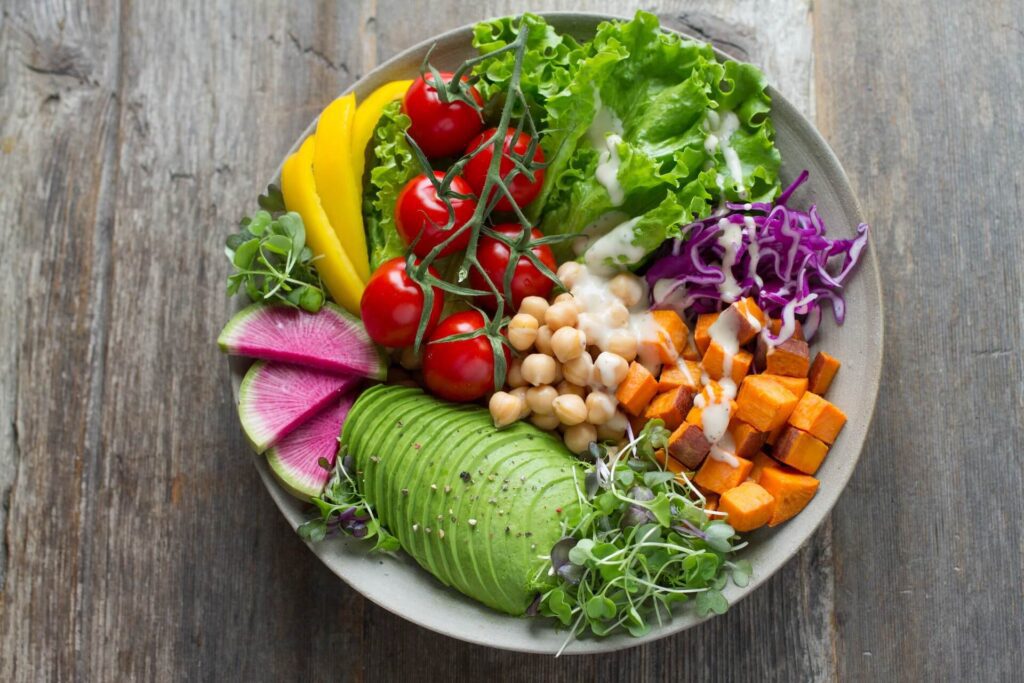Melissa Mitri, MS, RD, is a registered dietitian nutritionist, weight loss specialist, and expert health writer with over 15 years of experience in the health and wellness industry. Melissa has worked in a variety of healthcare settings where she helps clients improve their diet through an individualized approach.
You want to eat healthier, but you’re unsure where to start. As a Registered Dietitian, today I’ll share my top 8 tips to healthy eating. For example, is low-carb better? Should you go keto or vegan? Is dairy bad?
To help you navigate through all the nutrition “noise,” we’re getting back to the basics today with my top 8 tips to healthy eating. Let’s get to the facts and dive in!
1. Focus on what to eat, not what to avoid
When it comes to changing your diet, it’s helpful first to focus on what to add versus what to take away. This is a much more enjoyable, effective, and sustainable way of eating.
For example, instead of telling yourself you have to swear off all pasta because it’s too high in carbs, focus on enjoying quality carbs like whole grain or chickpea pasta instead.
When you feel you can’t have something, it usually leads to wanting it more and eventually losing control over that food.
2. Drink water as soon as you wake up
We all know drinking water is good for us – it helps our brain and body function at its best. But the reality is that most of us don’t drink enough.
I advise my clients to start drinking water as soon as they wake up. Doing this gets you in the habit of drinking it right away, so it stays top of mind. This should be done before you eat anything or drink any coffee.
Keep water by your bed so it’s the first thing you see when you wake up. After just a few days, you’ll start to notice a difference in how you feel – more energetic, less thirsty, and more focused.
3. Eat more wholesome foods
Aim to fill your plate with whole, minimally processed foods whenever possible. Whole foods are the foods found in the perimeter of the store – meat, poultry, fish, fruits, veggies, legumes, and whole grains.
These whole foods are typically higher in nutrients and lower in unhealthy ingredients like saturated fats and added sugars. They also will fill you up with fewer calories, which is essential if weight loss is one of your goals.
4. Follow the 80/20 rule
The 80/20 rule is a guide for your everyday diet – eat those healthy, wholesome foods 80% of the time and enjoy your favorite treats or minimally processed, packaged foods 20% of the time (if you choose to do so).
This rule creates balance in your eating habits and moves away from the all-or-nothing way of thinking.
My clients who follow this general rule also tend to be more consistent with eating well because they’re not over-restricting themself.
5. Pump up the protein
Protein is essential for health and plays a vital role in providing energy, building muscle, digestion, immunity, and wound healing. They also act as enzymes and hormones.
Getting enough protein at meals also helps with satiety and provides longer-lasting energy – something we could all get on board with.
Aim to get 1-2 protein sources with every meal such as fish, chicken, turkey, cottage cheese, tofu, Greek yogurt, nuts, nut butter, and legumes.
6. Add a fruit or veggie to every meal
Eating more plants is a proven way to improve your health. Research shows eating a variety of fruits and vegetables is linked to a host of health benefits such as a reduced risk for heart disease, digestive problems, cancer, and improved blood pressure.
Fruits and veggies are rich in vitamins and minerals that are essential to our health and well-being. Since most of us don’t eat enough of them, a simple way to start is by adding one to each meal.
For example, you can add a banana with your oatmeal, raw carrots with hummus at lunch, and a green salad for dinner. To serve as a reminder, put a sticky note on your refrigerator that says “Did you remember your fruit or veggie?” which can ensure it becomes part of your routine.

7. Consume healthy fats
Dietary fat still has a negative connotation in many ways. However, there are healthy, inflammatory fats out there like the essential omega-3 fats that provide numerous health benefits such as controlling inflammatory conditions like lupus, eczema, and rheumatoid arthritis. They also may play a role in protecting the heart.
These omega-3 fats are coined “essential” because our body cannot make them on its own. They, therefore, need to come from external sources like our diet and supplements. The best food sources are fatty fish, avocados, walnuts, flax seeds, and vegetable oils.
The type of omega-3s in foods is not always in the active form that can be directly digested in the body. Taking an omega-3 supplement like fish oil provides a direct source of DHA, the directly absorbable form of omega-3 fats.
8. Take a multivitamin
Sometimes despite your best intentions, you’re not able to get all of the nutrients you need through diet alone. Your body needs a wide range of nutrients for optimal health, and if you’re not eating enough variety in your diet it can be difficult to get everything you need.
In this case, taking a quality multivitamin with minerals can help fill in these diet gaps and provide peace of mind.
How To Apply These 8 Tips to Healthy Eating
Remember that above all else, healthy eating and getting in your daily nutrients doesn’t have to be complicated or restricted. These 8 tips for healthy eating are a solid start to nourishing your body in a balanced, sustainable way.
We know it’s not always easy eating healthy every day, so adding quality supplements can help provide peace of mind you’re doing your very best for your body and mind.
Click here to take a look at our formulary of quality vitamins, minerals, and omega-3s to start your journey to better nutrition today.

Melissa Mitri, MS, RD, is a registered dietitian nutritionist, weight loss specialist, and expert health writer with over 15 years of experience in the health and wellness industry.
Melissa has worked in a variety of healthcare settings where she helps clients improve their diet through an individualized approach.
- Latest Posts by Melissa Mitri, MS, RD
-
Planning Healthy Meals On A Budget
- -
5 Worst Foods For Arthritis
- -
5 Easiest Fruits and Vegetables to Grow, and Which To Buy
- All Posts

